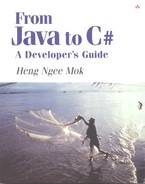7.3. Instance constructors
Instance constructors in C# are simply Java constructors. The reason for the name is because there is another group of constructors in C# called static constructors (see section 7.4).
Here is an example of a class with overloaded instance constructors.
1: using System;
2:
3: public class Test{
4: public static void Main(){
5: Test t1 = new Test();
6: Test t2 = new Test("Here is a string");
7: }
8:
9: // overloaded instance constructors
10: public Test(){
11: Console.WriteLine("Running default constructor");
12: }
13: public Test(string i){
14: Console.WriteLine("Running constructor with param");
15: }
16: }
Output:
c:expt>test Running default constructor Running constructor with param
Like Java
Instance constructors must have the same name (and case) as the immediately enclosing class, and cannot return a value.
Constructors are special methods of a class that will always be called when an instance of that class is first created.
The rule of constructor chaining still applies – invoking the constructor of a class always invokes the constructor of its superclass recursively all the way to System.Object.
Unlike other methods, constructors are not inherited to subclasses.
You can overload constructors.
A default constructor [5] is provided if no constructor is explicitly coded in the class. However, when at least one constructor is coded in a class, the default constructor will not be provided implicitly.
[5] A default constructor refers to the constructor which takes in no parameters.
You can use the this keyword to invoke an overloaded constructor in the same class (see section 7.6).
